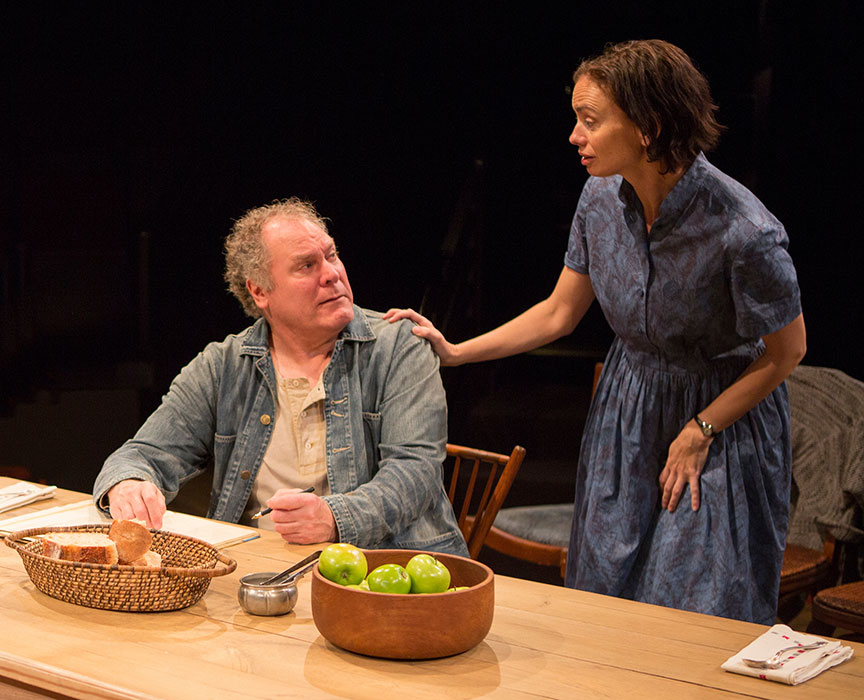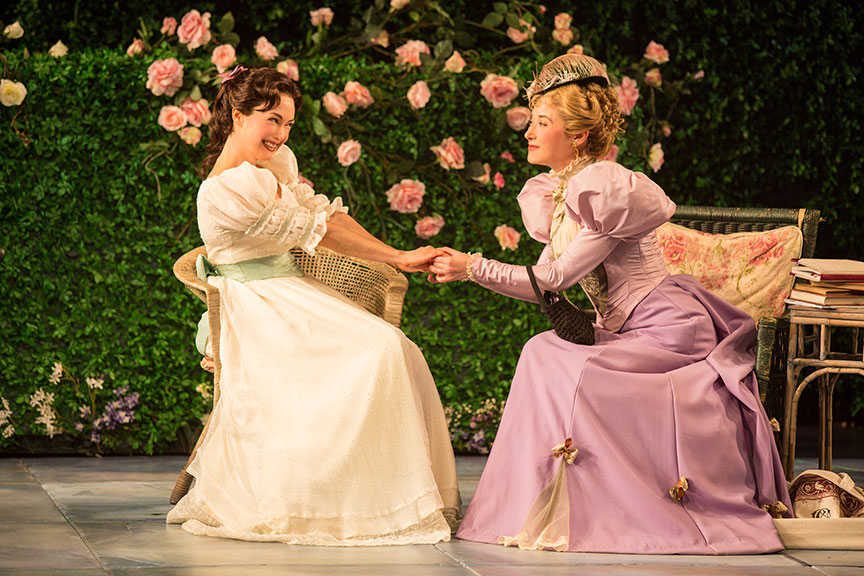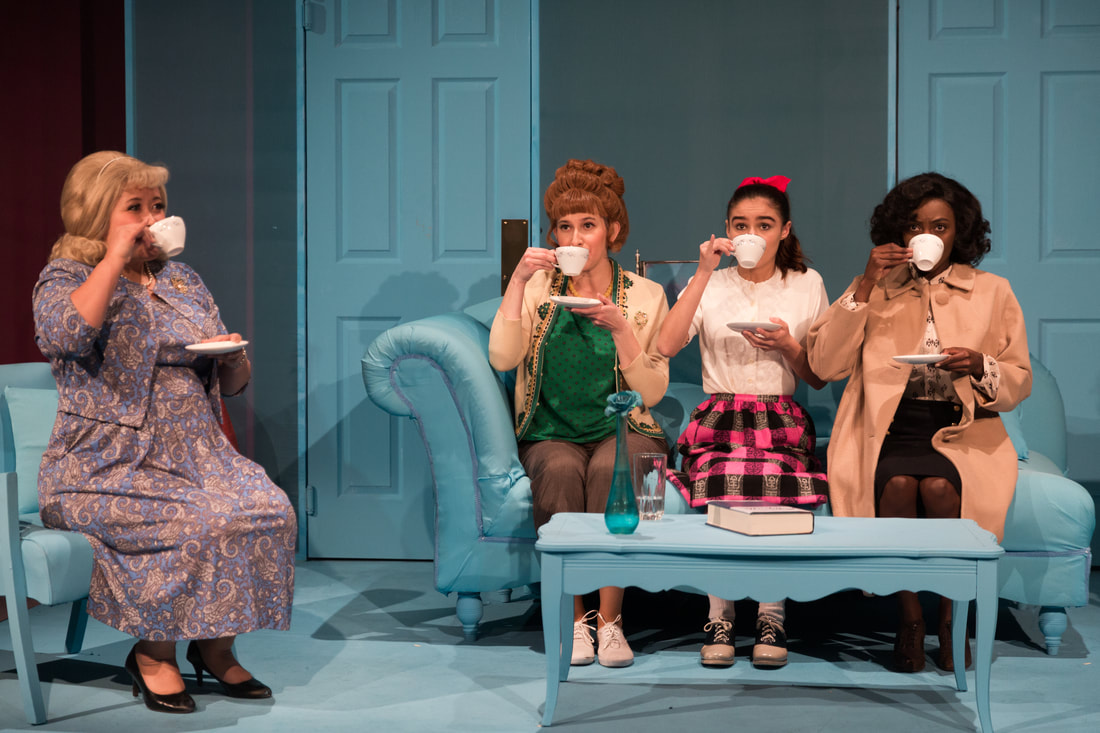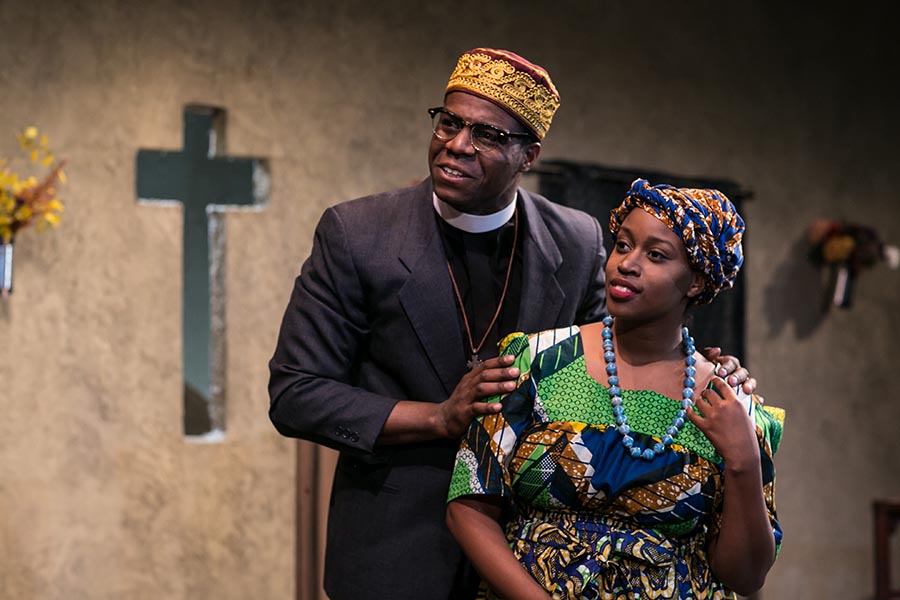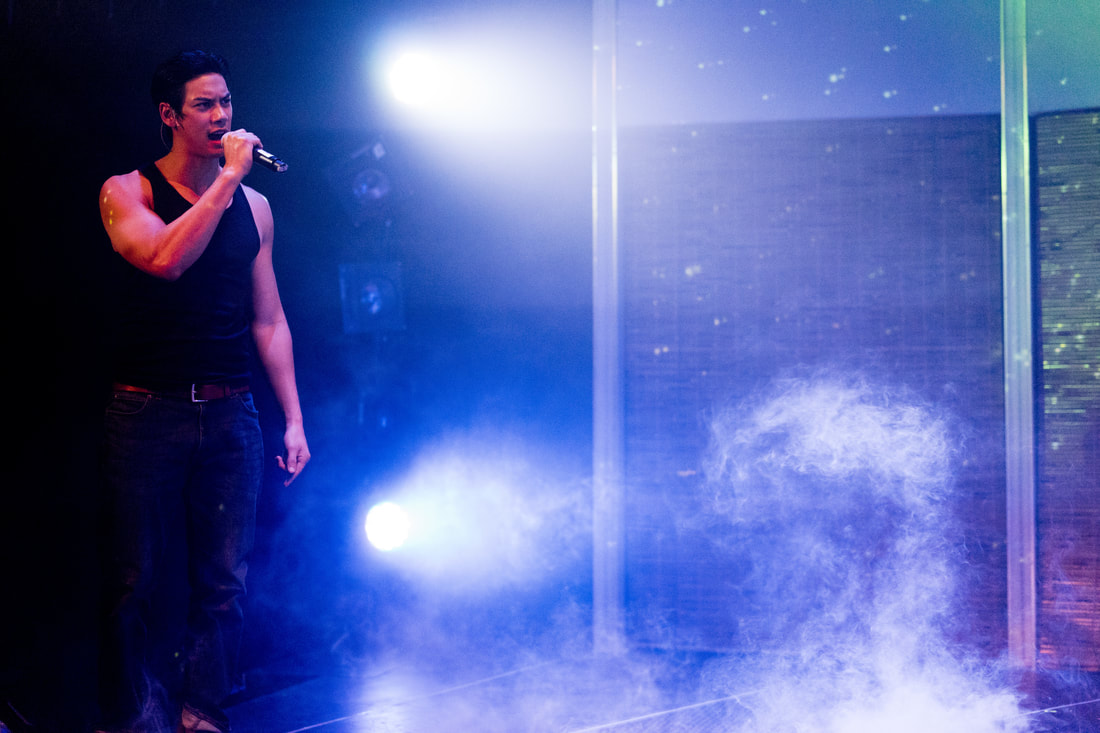|
The world of Steven Dietz’s prefab play isn’t so much random as it is highly coincidental. But then This Random World makes for a much bolder title than This Highly Coincidental World. By any name, Dietz’s world is one in which connectivity pervades, and Facebook has nothing to do with it. Fatalistic Beth Ward (Lisel Gorell-Getz) gets a kick out of Googling obits of others with her same name, and she urges her sad-sack brother Tim (Kevin Hafso-Koppman) to do so, while also fearing that their mother Scottie (Anne Gee Byrd) is at death’s door. Before leaving on a trip purposely “off the grid” to Nepal, Beth not so casually inquires about Tim’s long-past girlfriend, Claire (Diana Irvine).
Well, what do you know? Tim proceeds to post a faux obit of himself, and it’s seen by Claire, who has just been dumped by Gary (Patrick Zeller), who happens to meet Beth while climbing a mountain in Nepal. Mother Scottie, meanwhile, has instructed the sister (Ava Hill) of her caregiver (Yolanda Franklin) to travel to Japan on a benedictive quest where ultimately she meets, of course, Beth, whose Nepal trip was waylaid. These serpentine machinations aside, North Coast Repertory Theatre’s production of This Random World is a satisfying one, and in spite of the play’s love of weighty platitudes, it’s often quite funny. Irvine, for example, makes Claire’s case of neurotic low-self-esteem an art form, as does Hafso-Koppman with Tim’s hapless confusion. This raises the question of what those two characters were like when they actually were a couple. A shrink’s dream? Director David Ellenstein keeps all the plates spinning in this one-act show, which consists of short scenes that pair up its characters in various venues and in various serendipitous – or not so serendipitous – situations. In spite of the fact that the random encounters in the script are mostly very foreseeable, Dietz has crafted a world of characters whose personal dimensions transcend their mere place in his game of chance. Each longs for something that he or she doesn’t possess, and with the exception of Scottie, confident dispenser of the play’s aphorisms about life and death, each has a restless heart. (Review originally published in San Diego CityBeat on 2/28/18.)
0 Comments
Below: Manny Fernandes, Francis Gercke and Robert Smyth in "Camping with Henry & Tom." Photo by John Howard  In spite of the whimsicality of its title, Mark St. Germain’s “Camping with Henry & Tom” is a confrontational play. In imagining what might have happened when the automaking titan Henry Ford and the great inventor Thomas Alva Edison brought President Warren G. Harding along on one of their recurring camping adventures, St. Germain pits egos against egos and ideologies against ideologies in a kind of three-way sparring match. The resultant eruptions propel a story that begins with a hapless accident in the Maryland woods but soon turns dark and combative. Lamb’s Players Theatre is opening its 2018 season by staging the San Diego premiere of “Camping with Henry & Tom,” which debuted way back in 1993. Lamb’s previously enjoyed success with its thoughtful production of St. Germain’s “Freud’s Last Session,” another speculative work, in 2015. (In fact, that production’s co-stars, Francis Gercke and Robert Smyth, return in “Camping” as Ford and Edison respectively.) A sometimes awkward amalgam of comedy and drama, the Deborah Gilmour Smyth-directed “Camping with Henry & Tom” is not as durable a play as “Freud,” but it too is an actors’ showcase, with Gercke, Smyth and Manny Fernandes (as Harding) gamely stepping into the shoes of three larger-than-life historical personages, circa 1921. Stranded in the woods after hitting (with one of Ford’s spanking-new Model A’s) a deer, the bombastic Ford, irascible Edison and likably bland Harding find themselves with nothing to do after fashioning a makeshift campfire except talk. A lot. What begins innocently enough gives way to animus as the unsuspecting Harding discovers that the hyper-ambitious Ford intends to blackmail him (and he’s got plenty of damning ammunition) in return for getting cheap the Muscle Shoals hydroelectric plant and a pathway to the presidency for himself. Harding soon retaliates, with Edison somewhere in the middle, moralizing. The arch tenor of the first act yields to a second in which the revelations turn uglier (Ford’s anti-Semitism, for one) and the roused Edison injects himself more into the fray. At the same time, Fernandes’ Harding lets loose, insouciantly rebuffing Ford’s threats one minute, and literally howling like a wolf the next. The emotive register is all over the place by this time, with even the unseen, not-quite-dead deer eliciting sympathy from offstage. Whatever affection may have actually existed between Ford and Edison doesn’t really come through here. On their own, however, Gercke brings a little P.T. Barnum flash to his Ford, a man of sweeping and disturbing personal contradictions, while Smyth’s Edison is cerebral and patently realistic in a part that feels underwritten. Fernandes nicely humanizes Harding, an admittedly reluctant president who died two years into his term and who is best-known for the scandals revealed after his passing. Its insinuations about executive leadership (run the country like a business!) and dirty politics don’t necessarily make the quarter-century-old “Camping with Henry & Tom” a play for today’s times, but they certainly now, as perhaps they did before, give us pause. (Review originally published in the San Diego Union-Tribune on Feb. 26.) Jay O. Sanders and Yvonne Woods in "Uncle Vanya." Photo by Jim Cox Misery loves company on the grounds of the Serebryakov country estate where ashen spinster Sonya Alexandrovna (Yvonne Woods) and her deeply disillusioned (with existence and with himself) Uncle Vanya (Jay O. Sanders) head a dour, mostly joyless household that operates on duty, humdrum decorum and little else. Visits by the local doctor, Astrov (Jesse Pennington) only add to the sense of ennui – and increase the consumption of vodka. It’s when Sonya’s father, Alexander Serebryakov (Jon DeVries) arrives with his comely young wife Elena (Celeste Arias) that the tenor of the environs shifts dramatically.
That’s Uncle Vanya, Chekhov’s quietly simmering (until the end of Act III of IV) dissection of life’s longings, impossible dreams and harsh realities, all of that manifested in the fate of the unfortunates who occupy the estate together for four months. The Globe staging in its Sheryl and Harvey White Theatre is a world premiere translation of Uncle Vanya by Richard Pevear, Larissa Volokhonsky and Richard Nelson, the director. It’s also a production that plays both to the intimacy of the performance space and to the confidences and mostly muted confrontations between Chekhov’s characters. In a technique called microphone matrixing, the actors, rather than being mic’d individually, perform beneath low-hanging microphones. Audience members are given special headphones that will amplify the sounds from the stage, though they really aren’t necessary, the White Theatre acoustics being what they are. Sanders’ title-role portrayal is a stalwart one and his Act 3 detonation startling and potent. The quiet strength of Sonya, too, is deftly conveyed by Woods, who among all those in this little realm that’s dark as a Russian night elicits compassion just as she gives it. Pennington, speaking in one soft register throughout, manages to make Astrov both likable and unlikable. Uncle Vanya is ponderous, and its principals’ self-pity and blaming tiring over four tense but slowly unfolding acts. It will, however, reward the patience of those who stick with it, because its yearnings and its heartbreaks mirror life itself. (Review originally published in San Diego CityBeat on 2/21/18.) Faith Prince in "The Cake" at La Jolla Playhouse. Photo by Jim Carmody As “issue plays” go, Bekah Brunstetter’s The Cake is, well, sweet. Its bipolar dialectic (northeastern liberal vs. southern conservative) comes with layers of relevant tenderness and dollops of hearty laughs, both of which might defuse a lesser message show, but Brunstetter’s script is stridently uncompromising. That’s good news for the La Jolla Playhouse production directed by Casey Stangl which closes the theater’s 2017-’18 season.
The purveyor of cakes is a North Carolina baker with a blonde wig, a Bible Belt belief system and a lot of unexpressed regret in her heart. Faith Prince is outstanding as Della, whose conscience and long-embraced values are rocked to the core when her late best friend’s daughter Jen (Aubrey Dollar) asks her to make a wedding cake for her and her fiancée Macy (Miriam A. Hyman) – another woman. Though overly sentimental at times, The Cake doesn’t cop out in deference to a neat and tidy resolution, and it skirts the edges of but never lapses into regional or political stereotyping. (Review originally published in San Diego CityBeat on 2/14/18.) Helen Cespedes (left) and Kate Abbruzzese in "The Importance of Being Earnest." Photo by Jim Cox As dependable as the sun coming up over the English countryside, Oscar Wilde’s venerable comedy of manners The Importance of Being Earnest entertains mightily, staging after staging. So it goes at the Old Globe Theatre, whose production directed by Mara Aitken is both eye candy and ear candy. Inhabiting its sumptuous sets designed by Hugh Landwehr and romantically lit by Philip S. Rosenberg, a smart and sprightly cast milks every drop from Wilde’s shamelessly witty script. Both the male leads, Matt Schwader (as Worthing) and Christian Conn (as Algernon), and all three female principals (Kate Abbruzzese as Gwendolen, Helen Cespedes as Cecily and Helen Carey as Lady Bracknell) look tremendous, first of all, in Fabio Toblini’s costumes; yet it’s their verbal thrusting and parrying as they play the story’s delicious games that are most engaging about this lush production.
The Importance of Being Earnest is featherweight, escapist comedy for those wild about Wilde and wild about words. (Review originally published in San Diego CityBeat on 2/14/18.) Left to right: Lydia Lea Real, Morgan Carberry, Taylor Linekin and Alexandra Slade in "Bliss (or Emily Post is Dead!)" at Moxie Theatre. Karli Cardel Photography The mere fact that Emily Post, were she alive, would be shocked as hell by Jami Brandli’s Bliss (or Emily Post is Dead!) is reason enough to revel in this dark comedy that pretends (unfortunately, with much staginess) to be a Greek tragedy. The truth is, this joint world premiere (with Moving Arts of Los Angeles and Prometheus Theatre of Chicago) produced by the ever-fearless Moxie Theatre company is likable and quite funny in spite of itself.
Playwright Brandli’s device of transplanting the personae of Greek heroines Clytemenstra, Medea, Antigone and Cassandra to North Orange, N.J. in 1960 is inventive and a laudable undertaking, and Brandli no question knows her mythology. But she evidently wasn’t content with this device alone. On top of the Greek heroines who inhabit four women (well, three women and one teenaged girl), each in her own way oppressed or subjugated by a man, Brandli’s script leans heavily on a “mother’s little helper” pill-popping subplot, which on its own would be an amusing but thoughtfully poignant commentary on women of the time (and today) who are treated badly, even abused, by men and who feel like they have no way out. But the combination of the heavy-handed mythology and the pills bit results in a swollen script that sometimes can’t get out of its own way, even with the always-stellar direction of Delicia Turner Sonnenberg. The cast has fun with the material in any event, especially Lydia Lea Real as Maddy (nee Medea), who seeks and gets the show’s heartiest laughs. Morgan Carberry’s Clementine (Clytemenstra) exudes the most vulnerability, and Taylor Linekin, a student at the San Diego School of Creative and Performing Arts, does very well with the challenging teen role. The talented Alexandra Slade seems stifled in the part of the pronouncement-issuing, required-to-be-unemotional Cassandra. Meanwhile, Steve Froelich, the one male member of the cast, appears and reappears wearing practically nothing as the arrogant god Apollo – by way of Chippendales. Deal with it, Emily Post. Bliss (or Emily Post is Dead!) runs through Feb. 25. Wrekless Watson and Andrea Agosto in "Cardboard Piano." Photograph by Simpatika Sometimes the best theater is disturbing, and Hansol Jung’s Cardboard Piano, at least in Act One, is certainly that. So sudden is its violence and so unredeemable the consequences thereof that its characters seem to hang in mute suspension for the rest of the production,. But they don’t. The internal churning and anguish of the two who survive to the second act is nearly as wrenching as what preceded it. For these two characters, each his/her own definition of victim, forgiveness and catharsis are elusive. For the audience at Diversionary Theatre in University Heights, which is staging the West Coast premiere of Cardboard Piano, there is little relief, but much enlightenment.
In Jung’s story set in Northern Uganda initially on the night of the new millennium (Dec. 31, 1999), the Ugandan teen Adiel (Andrea Agosto) is celebrating her engagement to her white lover Chris (Kate Rose Reynolds,), who happens to be the daughter of the pastor of the church in which they are making their pact. Theirs is a profound but forbidden love, but they proceed undaunted – until a wayward soldier named Pika (John Wells III) barges in on them, wounded and desperate. The fourth personage in this tautly unfolding scenario is a deadly armed soldier (Wrekless Watson) who arrives looking for the fugitive, and it isn’t long from there that Act One’s fuse runs out. At a recent performance, members of the audience gasped in the darkness, and why was understandable. The second act of Cardboard Piano, set 15 years later in the same church, concerns itself with atonement, and while its events are less devastating than those before intermission, they are in their own way equally startling. Jacole Kitchen directs an ensemble at Diversionary that seethes with intensity. Among them, Watson, seen last year in Intrepid Theatre Company’s excellent Father Comes Home From The Wars, Parts 1,2, 3, is even better in this play, mostly in Act Two, in which his character “Paul” harbors a secret that spills out like blood. Cardboard Piano is an unsettling but important work. Cardboard Piano continues through Feb. 25. Jose Rivera’s emotionally rhapsodic Cloud Tectonics is the first mainstage production mounted by Teatro Pueblo Nuevo, New Village Arts Theatre’s bicultural outreach initiative. The time-tripping love story, with an apocalyptic, then idealized Los Angeles as its backdrop, dates back to the 1995 Humana new-play festival in Louisville and to La Jolla Playhouse, where it made its West Coast premiere. At NVA, Herbert Siguenza directs a sensual staging that evokes the dreamlike play’s dark and inscrutable atmospherics yet places the emphasis where it should be: on its passionate and yearning characters.
Nadia Guevara beautifully underplays Celestina del Sol, the anchor of the tale and the woman who in Rivera’s world of magical realism and metaphor, can stop time with and for love. The unsuspecting but powerless Anibal de la Luna (Jose Balistrieri) learns this on a night – or is it two years? – that challenges his very comprehension of time … and much more. Cloud Tectonics, like other fabulist works of literature or drama, resides in its enchantment with the inexplicable and the lyricism of its words. (Review originally published in San Diego CityBeat on 2/7/18.) Ben Levin in "Vietgone" at the San Diego Repertory Theatre. Photograph by Daren Scott The ingenuity of playwright Qui Nguyen is on exuberant display in the San Diego Repertory Theatre’s production of Nguyen’s 2015 Vietgone. His “geek theater” play is populated by everything from renegade bikers and pot-happy hippies to sword-wielding ninja warriors. At the core, however, is the story of how Nguyen’s Vietnamese parents fled following the fall of Saigon and met up in the good ol’ USA, where a sex-crazed love affair began.
In spite of a good deal of sophomoric comedy and some anachronistic rapping, Vietgone advances a thoughtful, sobering premise about the war and its aftermath from the viewpoint of those whose country was its bloody battleground. In an all-around impassioned performance, Ben Levin soars as Viet pilot Quang, while Katherine Ko brings attitude and fire to the part of his lover, Tong, whose ardency conceals many hurts. A graphic novel come to life, Vietgone is at times overwrought and searching for easy laughs, but its meditative side has staying power. (Review originally published in San Diego CityBeat on 2/7/18.) |
AuthorDavid L. Coddon is a Southern California theater critic. Archives
July 2024
Categories |
David Coddon |
|
